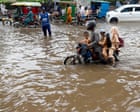
In our interconnected world, environmental challenges and strategic initiatives across different regions continue to shape the lives of millions in profound ways. Recent developments from Pakistan, Portugal, and Antarctica illustrate both the urgency of addressing environmental threats and the inspirational efforts being undertaken to combat them.
In Pakistan, the country faces the formidable dual challenge of accelerated glacial melt and intense monsoon rains. These two natural phenomena have converged to trigger devastating floods and landslides, affecting countless lives and causing widespread devastation. As glaciers across northern Pakistan melt at unprecedented rates due to record-breaking summer temperatures, the resulting floodwaters mix with heavy monsoon rains, leading to deadly flash flooding. In recent weeks alone, these conditions have resulted in the tragic loss of at least 72 lives and have injured more than 130 people since the onset of the rains in late June. These events echo the catastrophic flooding witnessed in 2022, rekindling fears of similarly destructive impacts.
Meanwhile, in Portugal, the city of Santarém has taken proactive steps to enhance its capacity to tackle forest fires, an increasingly common threat during the hot summer months. The municipal aerodrome has undergone significant upgrades, with the local authorities overseeing improvements such as runway regularization, enhanced safety zones, and the rehabilitation of circulation paths. These upgrades are vital in ensuring that the aerodrome can support advanced firefighting operations by accommodating new aerial firefighting resources, ultimately safeguarding the verdant landscapes of the region from potential calamities.
Turning our attention to Antarctica, a region of immense ecological significance, the world applauds the commendable work of a coalition dedicated to its preservation. The Gulbenkian Prize for Humanity was recently awarded to this coalition for its unwavering commitment to protecting the Antarctic environment. This icy continent, which holds approximately 90% of the planet’s freshwater ice and is a key contributor to global ocean circulation patterns, remains a vital area of focus for global climate action. By recognizing the coalition’s endeavors, the Gulbenkian Prize highlights the importance of international cooperation in safeguarding the world’s most critical ecosystems against the far-reaching impacts of climate change.
In a complementary development, the city of Lisbon has embarked on an ambitious program to enhance the efficiency of its public transportation system. With a focus on creating dedicated corridors for public buses, the initiative seeks to optimize the city’s transportation infrastructure, making it more reliable and accessible for its residents. Lisbon’s strategy involves the careful identification of thoroughfares with multiple lanes in a single direction, which will be integrated with the city’s bus network, Carris. By prioritizing public transport efficiency, the program not only aims to reduce traffic congestion but also to promote sustainable and environmentally friendly urban mobility.
These diverse developments demonstrate a global commitment to facing environmental challenges head-on while strategically planning for a more sustainable future. From crisis management in Pakistan to infrastructural upgrades in Portugal, from Antarctic preservation efforts to public transportation improvements in Lisbon, these stories reflect a world attuned to the balance of resilience and innovation. Together, they serve as reminders of the collective responsibility we share in preserving the intricate systems of our planet
Source: {link}
